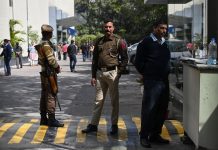 A day after Praveen Togadia went “missing” and was later found in an unconscious state at a park in Ahmedabad, the VHP’s international president on January 16 alleged that attempts were being made to suppress his voice. Togadia also met Patidar agitation head Hardik Patel and Congress leader Arjun Modhwadia on the same day. Media houses suddenly got busy in chalking out plans to cover this development in a big way as it was for the first time that a top leader of a prominent right-wing Hindu nationalist organisation was openly hinting at his rift with the present government, and even the Rashtriya Swayamsevak Sangh (RSS).
A day after Praveen Togadia went “missing” and was later found in an unconscious state at a park in Ahmedabad, the VHP’s international president on January 16 alleged that attempts were being made to suppress his voice. Togadia also met Patidar agitation head Hardik Patel and Congress leader Arjun Modhwadia on the same day. Media houses suddenly got busy in chalking out plans to cover this development in a big way as it was for the first time that a top leader of a prominent right-wing Hindu nationalist organisation was openly hinting at his rift with the present government, and even the Rashtriya Swayamsevak Sangh (RSS).
Had the incident been reported in detail, it would have dented the popularity of the ruling NDA among its hardcore voters. But things changed dramatically within hours. By afternoon of the same day, another report “Government ends Haj subsidy from this year” started flashing on the screens of mobile phones and television sets. Editors, anchors and experts suddenly started opining on the issue. An atmosphere of jubilation could be seen among Muslims and non-Muslims alike. Welcoming the move, the All-India Muslim Personal Law Board said: “The subsidy was not given to those going on Haj but it was for Air India that is running in losses. It was an eyewash. Muslims were cheated in the name of the subsidy.” The government, it was alleged, used to almost force Haj pilgrims to travel by the state-run airline.
All this started in May 2012 when the Supreme Court had directed the then central government to phase out the Haj subsidy within 10 years. The Modi-led central government took it forward and cancelled the subsidy. Minority Affairs Minister Mukhtar Abbas Naqvi confirmed that from this year there will be no subsidy for Haj. At the time of the order from the apex court in 2012, the centre had spent more than 600 crores a year on the pilgrimage, most of which went to Air India. According to reports, the government had spent 250 crores on airfare subsidies for Haj pilgrims last year.
While some consider the move as an end to the politics of appeasement in favour of empowering the Muslim community, most followers of Islam are of the view that subsidy for Haj was against the spirit of their faith. According to Islamic books, only Muslims who are physically and financially sound are expected to perform Haj at least once in their life time. That also, with their honest and hard-earned money. One can’t go to pilgrimage with borrowed money or any other form of assistance.
Even otherwise, a closer analysis of Haj subsidy tells a different tale. Let’s take the year 2016 as an example to understand the whole thing. The government that year charged 2,21,050 for ‘green category’ pilgrims. It included 45,000 airfare, 7,567 airport charges and Rs 1,000 Haj committee fee. For accommodation at Makkah and Madina, each pilgrim was charged 5,000 Saudi riyals. Then there was another head called ‘others’, under which 4,240 riyals were charged without any detail of break-up. Apparently, 180 riyals were for local transport and 500 riyals for Muallim’s (guide) fee. If we deduct 680 riyals from 4,240, we got 3,560 riyals – which leaves approximately 64,500 that was being charged without any explanation. Also, 2,100 riyals were also charged which were returned to the pilgrim upon their arrival in Makkah for food and other expenses.
Similarly, airfare in the open market, if booked in advance, is most likely to be much lower than what was being charged by the government. Generally, it is in the range of 23,000-25,000 for bulk bookings. Thus, roughly speaking, the government has been charging pilgrims approximately between 85,000-95,000 extra for years. In the words of All India Majlis-e-Ittehadul Muslimeen (AIMIM) chief Asaduddin Owaisi, the subsidy amount of 450 crore was being utilised by the airlines, either Air India or some other international carriers. “If a global tender is called on lesser prices, more people will go for Haj,” he recently told a news channel.
As suggested by many, the State’s money should be put to better use, such as educating minorities and weaker sections of society as the minorities affairs minister has assured. “The money saved by scrapping the subsidy will be used for education and to empower minorities,” Naqvi was quoted as saying. This, if implemented, would be in line with the slogan of “sabka saath, sabka vikas” that was given by Prime Minister Narendra Modi during his campaign for the 2014 general elections.
Interestingly, it is not just Haj pilgrimage that was subsidised. A recent report highlights that many state governments fund pilgrimages. At present, up to 5,000 crore is being spent on Mahakumbh at Ujjain alone. States such as Chhattisgarh, Gujarat, Karnataka and Madhya Pradesh provide money to residents going to the Manasarovar yatra to cover a part of the expenses. All this, however, contradicts Article 27 of the Constitution that states that taxes from individuals should not go towards “payment of expenses for the promotion or maintenance of any particular religion or religion’s denomination”.
Will the axe fall on the subsidy offered to other religious events too? As of now, it does not seem so. While Haj subsidy, which was 685 crore in 2011, came down to 200 crore in 2017, the government’s assistance to various other religious events in the country has seen an upward trend, with a few of them witnessing more than 100 per cent jump. In 2015, the Akhilesh Yadav-led Uttar Pradesh government doubled the Mansarovar yatra subsidy to 50,000, followed by new chief minister Yogi Adityanath who further doubled it in 2017 to 1 lakh. In 2013, the Manmohan Singh government diverted 800 crore — which was meant for irrigation and urban development in Uttar Pradesh — towards organising the Kumbh in Allahabad.
The list of subsidy programmes offered to people of different religions to visit their Holy places is quite long. Almost every government and each state does it to woo its prospective voters. Scrapping Haj subsidy is a move in the right direction. Thousands of crores of rupees meant for subsidising religious trips may be utilised in much better ways. Investing in education, infrastructure and poverty upliftment programmes will go a long way in empowering common Indians and strengthening the country.
One can only hope that welfare of the people was in the mind of authorities when they suddenly announced an end to the Haj subsidy on January 16 this year and the move was not intended to deflect the attention of the media and masses from the internal tussle among Hindu right-wing forces and the ruling BJP government. By the way, a senior member of Margdarshak Mandal, the highest decision-making body of VHP, recently hinted that Togadia would be removed from the top post for making remarks against the Central and Rajasthan governments..
letters@tehelka.com













